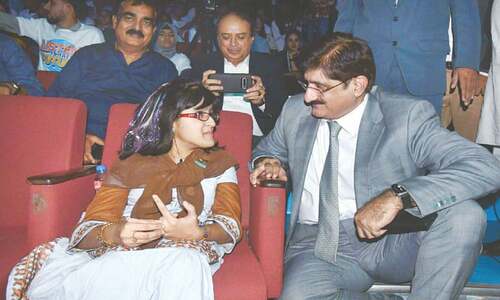 KARACHI, Dec 4: As the emergency rule imposed on Nov 3 has entered its second month with the fundamental rights of the common people still suspended, criminals carried out their business in the city at a much faster pace during the month than before.
KARACHI, Dec 4: As the emergency rule imposed on Nov 3 has entered its second month with the fundamental rights of the common people still suspended, criminals carried out their business in the city at a much faster pace during the month than before.
Figures compiled by police authorities and the Citizens-Police Liaison Committee (CPLC) suggest a sharp rise in street crimes along with shootouts, bank robberies and killings of security men during the days between Nov 3 and Dec 2.
“Till Dec 3, 4,740 mobile phones had been stolen or snatched at gunpoint since Nov 3,” said an official citing the figures compiled on the basis of reports gathered from police stations.
“These figures are obviously higher compared to that of a month earlier or the days between Oct 3 and Nov 2. During the month before the emergency rule, a total of 4,588 people were deprived of their mobile phones through theft or snatching that is believed to be the most prevailing activity in street crimes.”
Similarly, he said, the data also showed a jump in the cases of theft and snatching of cars in the city during the days of emergency. A total of 465 cars were taken away by robbers, compared to 437 vehicles hijacked in the 30 days before the Provisional Constitution Order was issued by President Pervez Musharraf as the chief of army staff.
“A total of 1,045 motorcycles had been stolen or snatched from Oct 3 to Nov 2, and the number rose to 1,135 during the next 30 days,” added the official. “Though the figures of house robberies are not available, there is reason to believe that they had been higher than before.”
The month under the emergency rule — which witnessed the arrest of hundreds of lawyers, journalists and political activists, and police suppressed every attempt to protest against the suspension of the constitution, which forced some 17 judges of the Sindh High Court to go home after they refused to take an oath under the PCO — registered five bank robberies, in which the robbers hauled away more than Rs22 million.
In the month before the emergency rule, there were only two bank heists, which did cause financial damages but did not challenge the writ of law. On Nov 30, the bank robbery in a Saudabad branch of a local bank not only cost more than Rs5 million to the bank but also claimed three lives, including that of a policeman.
In November, criminals in Lyari — home to several gangs flourishing on extortion and arms and narcotics trade — reemerged after remaining quiet for some time and compelled the police to launch a new crackdown against criminals.
A couple of policemen also lost their lives while chasing armed motorcyclists in Usmanabad, an area close to Lyari Town, on Nov 18. Police arrested the suspected killers a week after the incident.
Area police officials admitted that the ratio of street crime had increased sharply in November but termed it a result of the protest campaign launched by the Pakistan People’s Party after the house arrest of its leader in Lahore.
They said the gangsters exploited the political activities, particularly in Lyari, which remained closed for almost a week in November amid violent protests and shootouts, which claimed three lives.
“But the situation is turning better,” said Fayyaz Khan, SP Lyari Town. “We have arrested some 69 people belonging to different groups and gangs in a month. They were wanted in several cases by different police stations of the town.”
The authorities say that the month under the emergency rule was not much different in terms of crime than the months when the constitutional rights of citizens were intact.
“I have not received any figures of crimes committed during the last month. So I can’t comment on that particular subject,” Ghulam Mohtaram, Sindh home secretary, told Dawn when his attention was drawn to the data compiled by the security institutions. “I think it (emergency rule) didn’t affect the situation either way.”
The situation, however, encourages members of civil society, the legal fraternity and political workers of opposition parties to claim that curbing the judicial activism was the real aim of the emergency rule under the PCO rather than addressing any threat to the state and destabilization of its institutions.
Justice (retd) Rashid A. Razvi, the newly-elected President of the Sindh High Court Bar Association, said the constitution provided for suspension of the fundamental rights of the citizens if the authorities believed that the law and order situation was threatened.
“But in the latest emergency, it was not the case,” he said. “The real purpose of the emergency rule was to destroy the institution of the judiciary and to curb the lawyers’ movement.”












































Dear visitor, the comments section is undergoing an overhaul and will return soon.